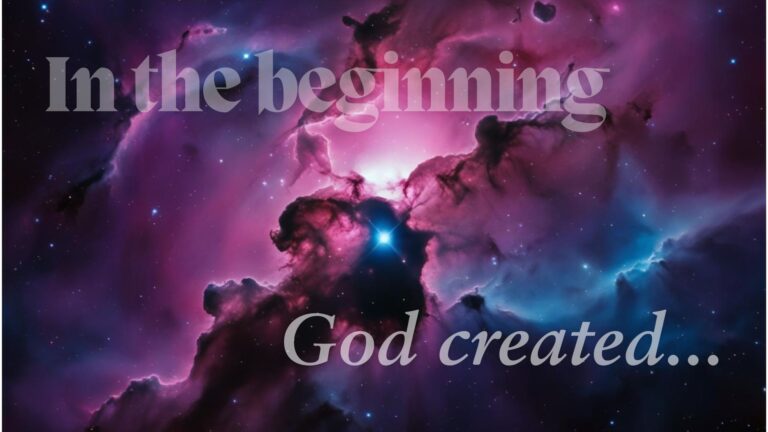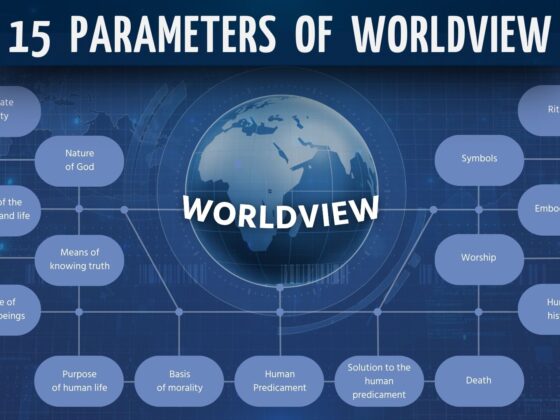Understanding the Origins of Life and the Universe: A Biblical Perspective on Worldview (Parameter 03 – Origins)
February 4, 2024
Note: This article is the third in a 15-part series about the parameters of a worldview. You’ll find links to the other articles at the end of this blog post as they become available. If you haven’t read the previous worldview parameter articles, start with part 1 here: Ultimate reality.
The origins of life and the universe are foundational topics in shaping a person’s worldview. How your students understand these origins is essential to comprehending their beliefs, behaviors, and attitudes. As educators, it’s crucial to explore how students view these complex issues. What do they believe about the beginning of everything? Does their worldview align with naturalism, pantheism, or the biblical account of creation?
In this post, we’ll examine three contrasting views of origins—Naturalism/Secular Humanism, Pantheism/New Age, and Theism/Biblical Christianity. Each of these worldviews provides a unique perspective on the universe’s beginnings and what it means for humanity. Understanding these perspectives will help you assess your students’ worldview and guide them toward a deeper biblical understanding. Let’s explore each view and consider how it shapes the way students perceive their identity, purpose, and moral responsibility.
3 Worldviews on Origins
Naturalism/Secular Humanism and Its View of Origins
Naturalism, often associated with secular humanism, posits that the universe is eternal or that it suddenly appeared through a process governed solely by natural laws. This worldview operates under the idea of a closed system where everything, from the origins of the cosmos to the smallest events, is explained through cause and effect. Evolution, the Big Bang theory, and the notion of random processes are key concepts in this framework.
For students influenced by naturalism, life and the universe have no intrinsic purpose other than what is assigned by human experience. Morality becomes subjective, based on individual or societal preferences, rather than absolute truth. In a naturalistic worldview, humans are seen as part of an ongoing, random process rather than created beings with purpose and dignity.
The Bible speaks directly to this mindset. Psalm 14:1 reminds us, “The fool says in his heart, ‘There is no God.'” Romans 1:20-22 further emphasizes that God’s eternal power is visible in creation, and those who deny this truth are without excuse. Colossians 1:16-17 declares that “in him all things were created… all things have been created through him and for him.”
If you’re exploring what your students believe about right and wrong, the post “I can know what is morally right and wrong for other people” provides insight into how secular humanism shapes their understanding of morality.
Pantheism/New Age and Its View of Origins
Pantheism and New Age philosophy assert that the universe is a manifestation of an eternal divine mind or spirit. In this view, all things—people, animals, and even inanimate objects—are interconnected and share a divine essence. There is no distinction between the Creator and the created; the universe itself is sacred, and everything in it reflects divinity.
For students who hold pantheistic beliefs, the idea of personal identity and purpose is bound up in this interconnectedness. Everything is part of the same divine whole, and therefore, individual identity is often fluid. Human responsibility, in this worldview, is about awakening to one’s true divine nature and living in harmony with the universe.
Isaiah 45:5-7 provides a clear contrast to this idea: “I am the Lord, and there is no other; apart from me there is no God.” John 1:3 affirms that God, not the universe, is the creator: “Through him all things were made; without him nothing was made that has been made.” 1 Timothy 6:15 further asserts that God is the sovereign ruler of all things.
For further exploration on how a biblical understanding of God’s Word intersects with other worldviews, see the post “I read or study the Bible”, which delves into the role of Scripture in shaping our worldview.
Theism/Biblical Christianity and Its View of Origins
In stark contrast to naturalism and pantheism, biblical Christianity teaches that God created the universe ex nihilo—out of nothing. Genesis 1:1 opens the Bible with the foundational truth: “In the beginning God created the heavens and the earth.” This theistic view holds that God not only created the world but continues to uphold it by His power, making the universe an open system where God remains sovereign over creation.
The biblical worldview asserts that creation is intentional, and everything exists for God’s glory. Human beings are created in God’s image with inherent dignity and purpose. This view provides a foundation for understanding morality: absolute moral truths are grounded in the character and commands of God. Through Christ, we find both the meaning of our existence and the moral framework for how we should live.
Hebrews 11:3 teaches that “By faith we understand that the universe was formed at God’s command, so that what is seen was not made out of what was visible.” Colossians 1:16-17 reminds us that “in him all things were created… all things have been created through him and for him. He is before all things, and in him all things hold together.”
If you’re seeking ways to help your students grasp their role in God’s created order, consider reading the post “3 Questions You Can Ask Your Students to Uncover Their Worldview,” which offers practical ways to guide students through their beliefs about creation.
Comparing Worldviews: A Biblical Understanding of Origins
Understanding the differences between these worldviews is essential to helping students develop a solid biblical foundation. Naturalism’s closed system contrasts with the open system of biblical Christianity, where God’s hand is actively involved in creation and history. Pantheism’s idea of interconnectedness is opposed by Christianity’s clear distinction between the Creator and creation.
Each worldview provides different answers to the questions of purpose, identity, and destiny. Naturalism leads to a view of life without ultimate purpose, while pantheism sees life as an endless cycle of spiritual growth. In contrast, biblical Christianity affirms that life has purpose, human beings are created in God’s image, and our ultimate goal is to glorify God and enjoy Him forever.
Acts 17:24-25 underscores that “The God who made the world and everything in it is the Lord of heaven and earth… and gives all men life and breath and everything else.” Revelation 4:11 declares, “You are worthy, our Lord and God, to receive glory and honor and power, for you created all things, and by your will they were created and have their being.”
Understanding Your Students’ Worldview on Origins
It is critical to assess your students’ beliefs about the origins of life and the universe. These beliefs form the foundation of their worldview, influencing how they interact with the world and approach their studies, relationships, and moral decisions. By understanding their views on origins, you can guide them toward a biblical understanding of creation, morality, and purpose.
Proverbs 4:23 reminds us, “Above all else, guard your heart, for everything you do flows from it.” Romans 12:2 challenges us to “Do not conform to the pattern of this world, but be transformed by the renewing of your mind.” Assessing students’ beliefs about their origins is essential for developing a biblical worldview that affects their attitudes and behaviors in all aspects of life.
To help you assess your students’ worldview, download the free PDF “10 Questions to Understand Student Worldview.” This tool will help you start conversations about their beliefs and guide them in their spiritual formation.
Next Steps: How to Assess and Cultivate a Biblical Worldview in Your Students
As you work to assess and mentor your students in the area of their worldview on origins, consider using tools like the 3D Worldview Survey. This survey can help you dive deeper into understanding and mentoring your students, allowing you to foster spiritual growth in line with biblical principles.
Ephesians 4:15 calls us to “speak the truth in love, we will grow to become in every respect the mature body of him who is the head, that is, Christ.” As you speak the truth into your students’ lives, you’ll help them develop a more robust biblical worldview that shapes their thoughts, behaviors, and attitudes.
If you’re ready to better understand your students’ worldview and start assessing their beliefs, download the free “10 Questions to Understand Student Worldview” PDF today. For deeper insights and tools, explore how the 3D Worldview Survey can be a vital resource in your school’s spiritual formation goals.
2 Corinthians 10:5 encourages us, “We demolish arguments and every pretension that sets itself up against the knowledge of God, and we take captive every thought to make it obedient to Christ.”
What Is the 3-D Worldview Survey?
- Take the 3-D Worldview for yourself
If you haven’t yet used the 3DWS with your class, check out the free “10 Questions to Understand Student Worldview” PDF below to get started.
#3dworldview #biblicalworldview #assessingworldview
All the Articles in the Worldview Parameter Series – links
- Ultimate reality
- Nature of God
- Origin of the universe and life (this article)
- Means of knowing truth
- Nature of human beings
- Purpose of human life
- Basis of morality
- Human predicament
- Solution to the human predicament
- Death
- Human history
- Worship
- Embodiment
- Symbols
- Rituals





